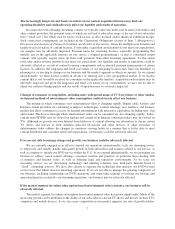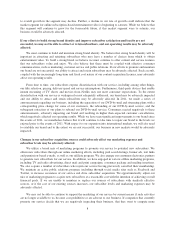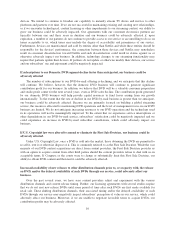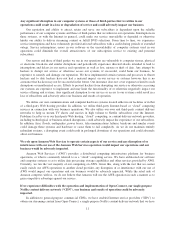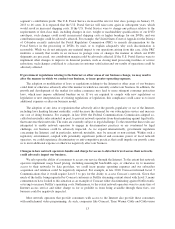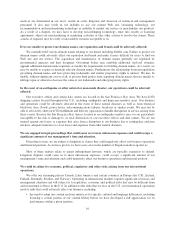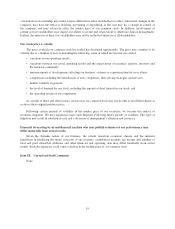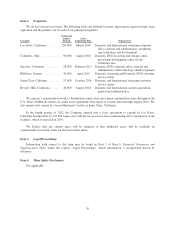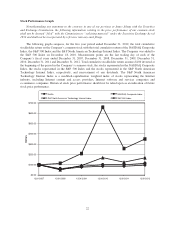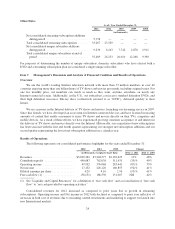NetFlix 2012 Annual Report Download - page 21
Download and view the complete annual report
Please find page 21 of the 2012 NetFlix annual report below. You can navigate through the pages in the report by either clicking on the pages listed below, or by using the keyword search tool below to find specific information within the annual report.• difficulties and costs associated with staffing and managing foreign operations;
• management distraction;
• political or social unrest and economic instability;
• compliance with U.S. laws such as the Foreign Corrupt Practices Act, export controls and economic
sanctions, and local laws prohibiting corrupt payments to government officials;
• difficulties in understanding and complying with local laws, regulations and customs in foreign
jurisdictions;
• unexpected changes in regulatory requirements;
• less favorable foreign intellectual property laws;
• adverse tax consequences such as those related to repatriation of cash from foreign jurisdictions into the
United States, non-income related taxes such as value-added tax or other indirect taxes, such as I.S.S.,
P.I.S., C.O.F.I.N.S. and C.I.D.E. in Brazil, changes in tax laws or their interpretations, or the application
of judgment in determining our global provision for income taxes and other tax liabilities given inter-
company transactions and calculations where the ultimate tax determination is uncertain;
• fluctuations in currency exchange rates, which could impact revenues and expenses of our international
operations and expose us to foreign currency exchange rate risk;
• profit repatriation and other restrictions on the transfer of funds;
• differing payment processing systems as well as consumer use and acceptance of electronic payment
methods, such as payment cards;
• new and different sources of competition;
• low usage and/or penetration of Internet connected consumer electronic devices;
• different and more stringent user protection, data protection, privacy and other laws; and
• availability of reliable broadband connectivity and wide area networks in targeted areas for expansion.
Our failure to manage any of these risks successfully could harm our future international operations and our
overall business, and results of our operations.
We may seek additional capital that may result in stockholder dilution or that may have rights senior to
those of our common stockholders.
From time to time, we may seek to obtain additional capital, either through equity, equity-linked or debt
securities. The decision to obtain additional capital will depend, among other things, on our business plans,
operating performance and condition of the capital markets. If we raise additional funds through the issuance of
equity, equity-linked or debt securities, those securities may have rights, preferences or privileges senior to the
rights of our common stock, and our stockholders may experience dilution.
We have issued debt offerings and may incur additional debt in the future, which may adversely affect our
financial condition and future financial results.
As of December 31, 2012, we had $200 million in 8.50% senior notes and $200 million in zero coupon
senior convertible notes outstanding. We also anticipate closing an offering of $500 million in 5.375% senior
notes, a portion of the proceeds of which will be used to redeem our 8.5% senior notes. Risks relating to our
long-term indebtedness include:
• requiring us to dedicate a portion of our cash flow from operations to payments on our indebtedness,
thereby reducing the availability of cash flow to fund working capital, capital expenditures, acquisitions
and investments and other general corporate purposes;
17


